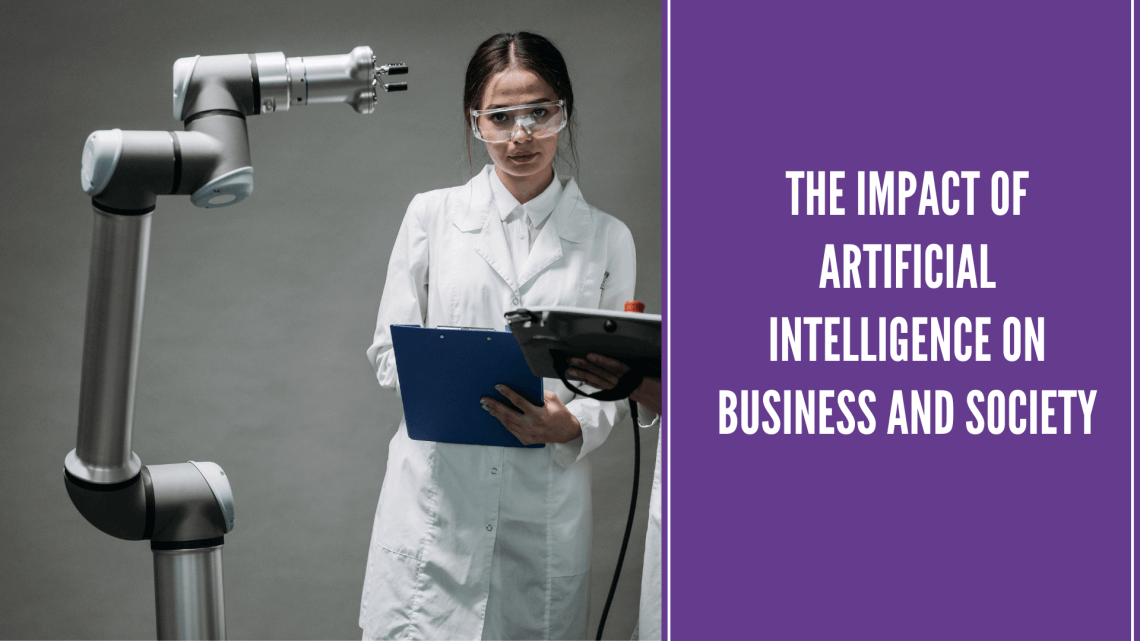
AI is already impacting business and social spheres, even if most people don’t notice it in its fullest yet. We are witnessing global changes, both positive and negative, catalyzed by AI. However, as an eternal optimist, I anticipate that the majority of changes will be beneficial, albeit potentially challenging for some individuals. It is easier to prepare only for positive impacts, but this will not be an objective approach. Become more aware of the advantages and disadvantages, challenges, and benefits that AI brings.

Image source: https://www.pexels.com/photo/woman-in-white-shirt-playing-chess-against-a-robot-8438951/
Women in Tech
Women have been historically underrepresented in the tech sector, but they are currently breaking barriers and making significant strides in AI development, data science, and engineering. Society is now reevaluating the influence and importance of women, and the technology field should do the same. Although some might perceive women's contributions to the technology field as isolated success stories, it is crucial to acknowledge the global impact of women, including their role in the creation and development of AI.
AI Impact on Business
AI is bringing changes that are too global for business to be accurately predicted. The shift from manual labor to AI will present both additional opportunities and challenges. For example, AI is used by both cybercriminals and information security specialists. Keeping in mind the increase in cyber attacks, it is time to integrate VPN for Macbook for all women in the technology sector. This can be any advanced tool; VeePN is ideal. Ultimately, it is up to you to choose the VPN provider.
Employment
We are all familiar with alarming predictions that AI could potentially take away our jobs. However, researchers generally agree that instead of displacing humans, the adoption of AI is more likely to alter both the nature of jobs and how we perform them.
According to the World Economic Forum's Future of Jobs Report 2018, while 75 million jobs may be displaced, there is a potential for 133 million jobs to be created as a result of the new division of labor between humans, machines, and algorithms.
Comprehensive AI Implementation
To successfully adopt AI, businesses must possess an active and coherent strategy. The strategy must be centrally controlled rather than executed in a patchwork manner. Businesses need to take a holistic approach to AI, reimagining entire processes and redesigning tasks to merge machine and employee skills.
While companies without legacy processes may have an advantage, even incremental change is preferable to none. A study conducted by Automation Anywhere and Goldsmiths, University of London revealed that companies augmented by AI experience a 28 percent performance improvement compared to their competitors.
Dealing with Data
The financial services sector has witnessed widespread adoption of AI. According to research by Forrester, around two-thirds of finance firms have implemented or are incorporating AI across various areas, ranging from customer insights to IT efficiencies. Fraud detection is already benefiting from data analysis.
In 2018, Jamie Dimon, the chief executive of JPMorgan, highlighted the potential benefits of machine-learning systems, estimating annual benefits of approximately $150m. These systems enabled the approval of 1 million "good" customers who may have otherwise been declined, while an equal number of fraudulent applications were rejected.
Education
During the recent controversy surrounding the marking of school exams in the UK, we witnessed the consequences of eroded trust in computer-generated results. An automated system, designed to grade A-levels consistently with previous years, sparked public outcry. The lack of transparency regarding the algorithms used, coupled with a lack of confidence in the metrics employed, undermined the entire process.
"That's the real problem. They relied solely on an algorithm, excluding human involvement. The data required much more human intervention. It needed someone contextually aware to step in and say, 'Wait a minute, that won't work.'"
AI Impact on Society
Positive Impact
If we touch upon the healthcare sector, AI will allow us to more accurately analyze and even diagnose diseases. This shift will allow for a more objective analysis of test data and will lead to cost reductions. According to McKinsey, big data has the potential to save the medicine and pharma industry up to $100 billion annually. AI can support the patient at all stages: from detection of the first symptoms to complete cure. With the right data, technology will be able to prescribe the most effective drugs for a given group of diseases and optimize the medication schedule. Medical staff will have more complete and faster access to key patient information.
Challenges
News outlets often talk about AI with alarm as a significant number of jobs are at risk. Those who study the impact of AI often tend to believe that artificial intelligence will not replace humans, but the changes will be significant. Many professions will be reimagined or require unique human abilities. According to PwC, the UK could witness the replacement of 7 million existing jobs by AI between 2017 and 2037.
Conclusion
Companies and employees alike should prepare for the likely widespread and occasionally perplexing changes that AI adoption will bring, along with the ethical and regulatory challenges that accompany it. Professor Susskind states, "Doubters struggle to comprehend that the pace of technological advancement is accelerating, not decelerating." "There is no visible endpoint. Machines will surpass us not by imitating us, but by leveraging the fusion of vast amounts of data, immense processing capabilities, and remarkable algorithms."






